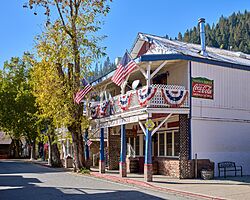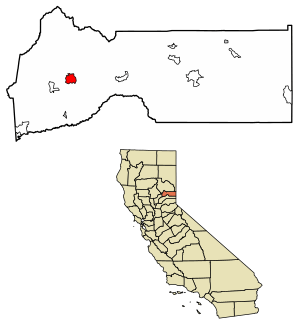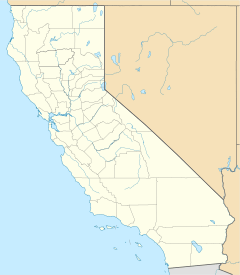Downieville, California facts for kids
Quick facts for kids
Downieville
|
|
|---|---|

Main Street in the Downieville Historic Riverfront District (2024)
|
|

Location of Downieville in Sierra County, California.
|
|
| Country | |
| State | |
| County | Sierra |
| Area | |
| • Total | 3.19 sq mi (8.25 km2) |
| • Land | 3.18 sq mi (8.24 km2) |
| • Water | 0.01 sq mi (0.01 km2) 0.17% |
| Elevation | 2,966 ft (904 m) |
| Population
(2020)
|
|
| • Total | 290 |
| • Density | 91.17/sq mi (35.20/km2) |
| Time zone | UTC-8 (Pacific (PST)) |
| • Summer (DST) | UTC-7 (PDT) |
| ZIP codes |
95936
|
| Area code(s) | 530 |
| FIPS code | 06-19794 |
| GNIS feature ID | 2583000 |
Downieville is a small town in Sierra County, California, United States. It is the main town, or county seat, of Sierra County. You can find Downieville on the North Fork of the Yuba River. It sits about 2,966 feet (904 meters) above sea level. In 2020, about 290 people lived there.
Contents
History of Downieville
Gold Rush Beginnings
Downieville started in late 1849 during the exciting California Gold Rush. This was a time when many people rushed to California hoping to find gold. The town was first called "The Forks." This name came from its location where the Downie River meets the North Fork of the Yuba River.
Soon, the town was renamed after Major William Downie. He was a Scotsman who led a group of nine miners to the area in 1849. Seven of these miners were African American men. They found a lot of gold where the town is now. They built a log cabin and stayed through the winter. By 1850, Downieville was a busy place. It had 15 hotels, 4 bakeries, 4 butcher shops, and many saloons.
A Town That Survived
In 1853, Downieville was one of many towns that wanted to become the new capital of California. However, the capital eventually moved to Sacramento in 1854.
During the Gold Rush, many mining camps had interesting names. Some were called Brandy City, Whiskey Diggins, and Poker Flat. Many of these camps became ghost towns after the gold ran out. Downieville had over 5,000 people in 1851. But by 1865, its population had dropped a lot. The town survived because it was the county seat for Sierra County. Its location between the Sacramento Valley and the Tahoe region also helped it stay alive.
Downieville's Population
In 2020, Downieville had a population of 290 people. The town covers about 3.2 square miles (8.3 square kilometers). Most of the people living in Downieville are White. About 4% of the population is Hispanic or Latino.
Fun Things to Do in Downieville
Downieville is surrounded by the beautiful Yuba River District of the Tahoe National Forest. This area is perfect for outdoor adventures.
Outdoor Activities
You can enjoy many activities here, such as:
- Fishing: Catch rainbow trout and German brown trout in the North Fork of the Yuba River.
- Mountain Biking: Downieville is famous for its bike trails.
- Jeeping and Motorcycling: Explore the backcountry on off-road vehicles.
- Kayaking: Paddle on the rivers.
- Hiking: Enjoy nature walks and explore trails.
- Gold Panning: Try your luck finding gold, just like the old miners!
- Exploring Gold Rush Sites: Visit places where the Gold Rush happened.
Mountain Biking Adventures
Downieville is a top spot for mountain biking. The famous "Downieville Downhill" trail is a thrilling ride. It drops 4,400 feet (1,341 meters) over 17 miles (27 kilometers). You can find shuttles in town to take you to the start of the trail. The trail includes long, narrow suspension footbridges over canyons.
The town also hosts the world-famous Downieville Classic mountain biking races. This two-day event has a downhill race and a very tough cross-country cycling race. In 2003, the Single Speed World Championship was held here.
Whitewater Rafting Thrills
Downieville is a popular starting point for whitewater rafting trips on the North Yuba River. Many companies offer guided rafting tours.
Downieville Museum Visit
The Downieville Museum is in an old stone building from 1852. It used to be a general store. The museum shows local artifacts, old items, and photos. These items tell the story of the community for over 160 years. You can see a small model of the town's business district from the early 1900s. There is also a copy of a 1,000-ounce (28-kilogram) gold collection from Sierra County mines.
Where to Stay
Downieville has many places to stay. Some are right on the North Fork Yuba River. You can find:
- Forest Service campgrounds
- Motels
- Bed and breakfast inns
- Rental cabins
- Backcountry campsites
Famous People from Downieville
Many interesting people have connections to Downieville:
- Lewis Francis Byington, a District Attorney in San Francisco.
- Robert Lewis Byington, who was part of the California State Assembly.
- Byington Ford, a real estate developer and military officer.
- Tirey L. Ford, who was California's 18th Attorney General.
- George E. Goodfellow, a doctor and naturalist.
- Warren Harding, a famous climber who was on the first team to climb El Capitan in Yosemite Valley.
- Joseph C. McKibbin, a lawyer and politician.
- Frank M. Proctor, a member of the Nevada Senate.
Town Services
Downieville has its own post office. The town's ZIP code is 95936. If you call someone in Downieville, their phone number will start with (530) 289-xxxx.
The town is also home to The Mountain Messenger, a weekly newspaper. It started in 1853. A fun fact is that Mark Twain, a famous writer, once wrote for this paper using his real name, Sam Clemens.
Geography of Downieville
Downieville covers about 3.2 square miles (8.3 square kilometers). Most of this area is land, with a very small part being water. The town is mostly built on "Riverwash" soils. Higher areas have different types of gravelly soil.
Gallery
See also
 In Spanish: Downieville (California) para niños
In Spanish: Downieville (California) para niños






